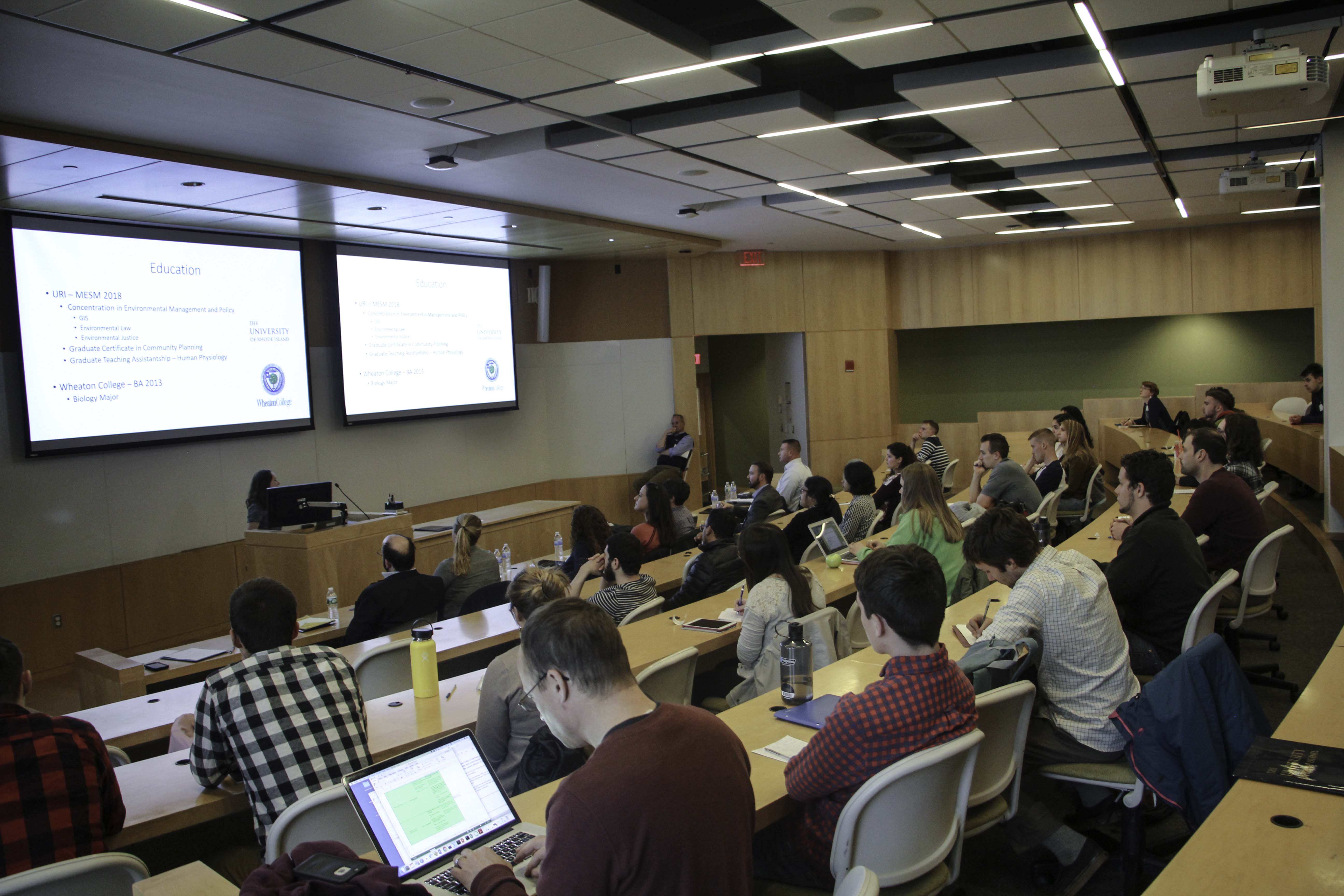Students were invited to attend Environmental Professional Night to learn more about the different fields they can work in. |Photo by Greg Clark.
Last Thursday, six companies that offer jobs in the environmental field came together for an Environmental Professionals Night, which aimed to help inform students about the different job opportunities available to them.
The event, which was held in the Center for Biotechnology and Life Sciences building, was spearheaded by professor Corey Briggs. Many students in the College of Environmental and Life Sciences may be unaware of the many different jobs they can do, which could limit their options for future employment.
“Don’t take your degree and think you’re going to be locked in based on your coursework,” Briggs said. “We would like some of these companies to provide scholarships, to provide internships. We would like this to be a sort of avenue for jobs so students establish a pipeline.”
The six companies that attended were Arcadis, Fuss & O’Neill Inc, Woodard and Curran, Mabbett & Associates Inc, US Ecology and GZA GeoEnvironmental Inc.
Each company had one or more representatives that took turns speaking for around ten minutes about their respective jobs and companies.
Many of the representatives were environmental consultants. They balance field work, including site remediation, groundwater sampling and soil investigation with office work, which includes filling due diligence reports and phase one and phase two site assessments. They help make sure that construction projects stay within set regulations and rules that are in place to protect the environment.
“I think that starting your career in consulting is a really good way to develop knowledge, develop skills, and also learn a lot about yourself,” said Carissa Koski, an environmental consultant at Arcadis. “It’s a very challenging and fast-paced work environment that constantly challenges you to learn and do better and be better. You learn a lot about environmental regulations, which is a huge driver for the work that we do, but not something that you really learn in school, so it’s very specific to want you’re doing.”
Hannah Parzen, an environmental consultant from Mabbett and Associates Inc. said that if people do this kind of work, they won’t just think about the natural environment, but also the human environment.
“I think about noise impact and socioeconomic impacts to the community we’re doing this in, environmental justice impacts [and] resources. I get to think about all these different kind of aspects of the environment.”
Some other tasks in environmental fields that workers may find themselves doing are hands-on geoprobe drilling, site characterization, storage tank closures, waste disposal, waste treatment and habitat assessments. They can also consult clients and file reports related to environmental procedures and maintenance.
Although these jobs are related to the environment, some projects may not be what students expect. Many times environmental professionals work with clients that are not interested in the environmental impact of their project.
“Sometimes the environmental aspect of a project is just a hurdle that they want to get over as quickly and as painlessly as possible… It’s not always cleaning up a site because it’s the right thing to do, a lot of the times it’s just something that has to get done,” said Patrick Dowling, from Fuss and O’Neill Inc. “But even though not all projects are glamorous or exciting, there’s a lot of projects out there that really can make a difference in the environment or making your community a better place. Those are the projects we really are passionate about and we really enjoy working on.”
In addition to the job tasks, representatives also talked about what they might look for in an applicant. Kelly Camp from Woodard and Curran gave her opinion, emphasizing the importance of the face-to-face interview.
“We have your resume, we see what you did,” Camp said. “Let’s say you’re fresh out of school. I’m more interested in your personality, your character, how you present yourself. Yes, what you did does help portray that, but it’s the face-to-face that is really important. What I always say is I can teach somebody Excel. I can teach somebody about air regulation. I can’t teach somebody to be a nice person and a hard worker.”

